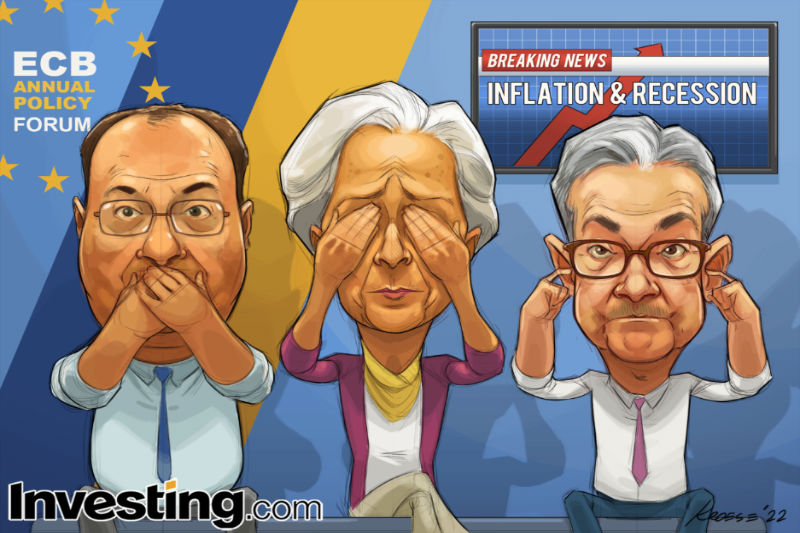By Geoffrey Smith
Investing.com -- Financial markets are increasingly worried about a recession, but central banks don’t care.
Or rather, of course they care, but - well, they’re sorry, but that’s not their top priority, y’know.
Three of the world’s most influential central bank chiefs – the Federal Reserve’s Jerome Powell, the European Central Bank’s Christine Lagarde and Bank of England Governor Andrew Bailey – could not have been clearer as they held a joint panel discussion at the ECB’s shindig in Sintra, Portugal, last week: They will raise interest rates as far as needed to stop the West’s biggest economies from repeating the inflationary spiral of the 1970s. And if that means causing a recession, so be it.
“Is there a risk that we’ll go too far? Certainly there’s a risk,” Powell said, quickly hedging with the caveat that: “I wouldn’t agree that it’s the biggest risk to the economy.” The bigger mistake, he said, “would be to fail to restore price stability.”
Admittedly, all three had been so well prepped by their PR teams that they managed to go through a full 90 minutes without any of them actually saying the R-word, but with financial markets thinking about little else, they hardly needed to.
Across both Europe and North America, the signs of a looming recession are getting clearer by the week, if not the day. The new orders components of most business surveys are in freefall: in the U.S., the orders part in the Institute of Supply Management's purchasing managers index is now below the 50 level that typically indicates contraction, having started the year at over 60. In the Eurozone, S&P Global (NYSE:SPGI) SPGI said its analogous PMI for June showed that "risks have increasingly tilted towards the economy slipping into a downturn," with new orders and business expectations both falling sharply. The Bank of England, meanwhile, warned in its half-yearly Financial Stability Report on Tuesday that "the economic outlook for the U.K. and globally has deteriorated materially."
Other time-tested recession indicators also check out: "Doctor Copper", famed for its ability to predict global economic activity, is down over 22% in the last month alone and is now at its lowest in 19 months. In the U.S. bond market, two- and 10-Year bond yields are trading almost on the same level, with momentum suggesting that the yield curve will invert within a matter of days (albeit the yield curve has to stay inverted for a decent time to reliably predict a recession).
"The Fed’s job of bringing down excess demand without crushing growth is getting harder," according to Samy Chaar, chief economist with Swiss private bank Lombard Odier. "Rising prices and inflation expectations mean that central bank must frontload its interest rate hikes." Chaar thinks a "mild recession" in the U.S. is likely next year, with Fed rates peaking at 3.5% and unemployment at 4.5% of the workforce.
However, it's a different situation in Europe, where activity is still below its pre-Covid trend, and where the nature of the inflation shock is very different, driven by Russia's war in Ukraine rather than the creation of excess demand by pandemic-era stimulus. In Europe, it looks increasingly likely that unprecedented energy prices will crush discretionary spending. With industry literally unable to fully replace missing Russian gas in the near term, there will also be hard limits on the amount of chemicals, glass and other energy-intensive products that the economy can supply. The ECB will not have to work as hard to squeeze out excess demand because energy markets will do the job for it.
For those reasons, markets are now already starting to price in a peak to ECB rates, even before it has started raising them. The ECB's guidance suggests that it will raise its deposit rate to 0.25% by September. Lombard Odier's Chaar sees it only raising a maximum 100 basis points after that before it has to cut again. That implies that the ECB's tightening cycle will - again - be over before real (that is, inflation-adjusted) interest rates can turn positive.
Markets are now busy drawing their own conclusions as to what that means for the euro: the single currency fell to its lowest level against the dollar in 20 years on Tuesday. Bond yields also plummeted, but that, at least, is a small consolation for Frankfurt, because it means that markets are not assuming that higher recession risk means higher risk of a Eurozone breakup. As long as that calculus holds, Lagarde and her colleagues can afford to talk tough on rates. But if Europe's solidarity cracks under pressure from the war in Ukraine, things will get very different, very quickly.
